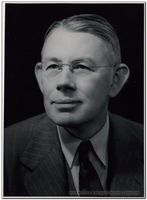 | Back to e-WV
| Back to e-WV
 The West Virginia Encyclopedia
The West Virginia Encyclopedia
 | Back to e-WV
| Back to e-WV
 The West Virginia Encyclopedia
The West Virginia Encyclopedia

One of West Virginia’s foremost historians, Festus Paul Summers (March 2, 1895-May 21, 1971) was born at Lockwood, Nicholas County. He was a direct descendant of William Morris, who made the first permanent settlement in the upper Kanawha Valley, and his son, Henry, a prominent Nicholas County pioneer.
Summers began his teaching career in a one-room school in Clay County. He also taught in Fayette and Mercer counties, and served as superintendent of schools in Jane Lew. He attended Concord Normal School and in 1923 earned an A.B. degree at West Virginia University Virginia University. After receiving an M.A. degree from the University of Chicago in 1927, Summers studied in 1927–28 at Columbia University.
From 1928 to 1931, Summers was professor of history and political science at Morris Harvey College in Barboursville. He then returned to WVU as lecturer in history and archivist. There he completed his doctorate in 1933. His academic preparation involved study under such luminaries as Charles H. Ambler, Oliver P. Chitwood, and James M. Callahan at WVU and Avery Craven, William E. Dodd, and Charlton J. H. Hayes at other institutions. At WVU he advanced to full professor in 1946, and from 1947 to 1962 he served as chairman of the history department.
Summers’s interests centered around the Civil War and statehood era and late-19th century political and economic developments in the new state. His books include The Baltimore and Ohio in the Civil War and William L. Wilson and Tariff Reform. He edited Cabinet Diary of William L. Wilson and A Borderland Confederate, and co-edited with Elizabeth Cometti The Thirty-Fifth State: A Documentary History of West Virginia. In 1958, Summers co-authored with Charles H. Ambler the second edition of West Virginia: The Mountain-State, which was already regarded as a standard one-volume history of the state. In 1943–44, Summers was president of the West Virginia Historical Society, which he had helped organize a few years earlier.
Written by Otis K. Rice